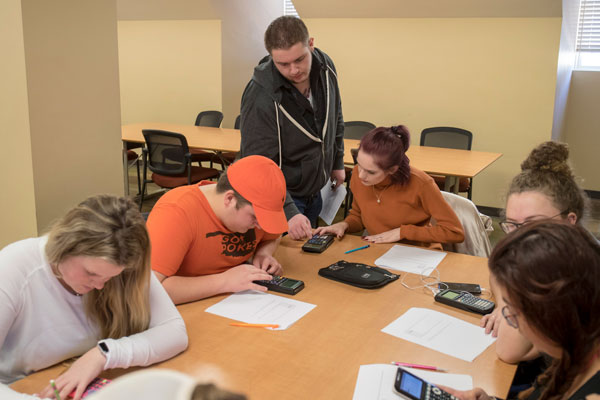Academic success skills in introductory college mathematics
Explicit attention to academic success skills can effectively complement math pathways and corequisite reforms to support students’ development as successful and independent learners. The MIP leverages research about growth versus fixed mindsets, the nature of memory and expertise, the integration of academic and social communities, academic identity, stereotype threat, and study skills to equip instructors with the tools to help students become more effective learners.
 Dweck and Legget (1988) conducted pioneering work on the interaction between individuals’ views of their intelligence and abilities with persistence and goal orientation. Individuals who viewed intelligence as innate and fixed typically adopted performance goals and tended to persist only in cases of perceived success, avoiding challenge when they perceived failure. In contrast, individuals who viewed intelligence as malleable and able to grow with use typically adopted learning goals, and tended to persist in seeking challenge regardless of success. Growing evidence supports this model generally, and specifically in the context of mathematics instruction (Blackwell, Trzesniewski, & Dweck, 2007). Aronson (2007) found the effects of these self-theories are magnified when gender or racial stereotypes of performance are activated in the learners, raising particular concerns for the performance and persistence of underrepresented populations in academic pursuits. Fortunately, these mindsets are not immutable psychological traits, and specific supports enable students to reconceptualize what it means to do mathematics and to be proficient at mathematics (Middleton, Tallman, Hatfield, & Davis, 2015). Other techniques, such as praising effort and process rather than success (Cimpian, Arce, Markman, & Dweck, 2007) and attributing mathematical talent to hard work and passion rather than innate ability (Good, Rattan, & Dweck, 2007) can also foster a growth mindset among students. In caution, directly focusing only on stereotypes can trigger rather than ameliorate stereotype threat, but it can enhance success when coordinated with the development of a growth mindset and when past underachievement is attributed to environmental, rather than genetic, factors (Aronson & Steele, 2005).
Dweck and Legget (1988) conducted pioneering work on the interaction between individuals’ views of their intelligence and abilities with persistence and goal orientation. Individuals who viewed intelligence as innate and fixed typically adopted performance goals and tended to persist only in cases of perceived success, avoiding challenge when they perceived failure. In contrast, individuals who viewed intelligence as malleable and able to grow with use typically adopted learning goals, and tended to persist in seeking challenge regardless of success. Growing evidence supports this model generally, and specifically in the context of mathematics instruction (Blackwell, Trzesniewski, & Dweck, 2007). Aronson (2007) found the effects of these self-theories are magnified when gender or racial stereotypes of performance are activated in the learners, raising particular concerns for the performance and persistence of underrepresented populations in academic pursuits. Fortunately, these mindsets are not immutable psychological traits, and specific supports enable students to reconceptualize what it means to do mathematics and to be proficient at mathematics (Middleton, Tallman, Hatfield, & Davis, 2015). Other techniques, such as praising effort and process rather than success (Cimpian, Arce, Markman, & Dweck, 2007) and attributing mathematical talent to hard work and passion rather than innate ability (Good, Rattan, & Dweck, 2007) can also foster a growth mindset among students. In caution, directly focusing only on stereotypes can trigger rather than ameliorate stereotype threat, but it can enhance success when coordinated with the development of a growth mindset and when past underachievement is attributed to environmental, rather than genetic, factors (Aronson & Steele, 2005).
Students’ identities as learners and as legitimate members of the academic community in which they are being trained have significant impacts on their success. Students among underrepresented populations in academic fields often separate their academic and social lives to succeed in their K-12 studies, but this strategy results in high failure and dropout rates in college (Treisman, 1992). Women often leave gateway math courses with decreased confidence in their abilities and are more likely than similarly-performing men to be dissuaded from their career goals by early academic challenges (Ellis, Fosdick, & Rasmussen, 2016; Lubienski et al., 2013; Matthews & Pepper, 2007; Mujtaba, et al., 2014). Early college experiences developing support around students’ common academic interests and employing cooperative-learning and active learning techniques can reverse these patterns (Severiens & Schmidt, 2008; Treisman, 1992; Weiss et al., 2015). Such efforts should also cover study skills specifically relevant to learning math, persisting in solving difficult problems, self-assessing, checking for sensible results, practicing and checking work, and critical thinking. The MIP definition of academic success skills is that
Academic success skills foster students’ construction of their identity as learners in ways that enable productive engagement in their education and the associated academic community.
Academic Success Skills Initiation Workshop
MIP faculty collaborations on Academic Success Skills began with an Initiation Workshop in May, 2019. At this workshop, faculty identified the central academic success skills, such as problem-solving, persistence, collaboration, communication, work ethic, and a growth mindset, critical for success in entry-level college mathematics. Results of that workshop guide the direction of current MIP work, primarily that of the Collaborative Research and Development teams of faculty that will develop, test, and refine course materials to support the development of academic success skills as an integral component of learning by inquiry in entry-level math classes.
Academic Success Skills CoRD Teams
We are currently accepting proposals for CoRD Teams for Academic Success Skills in entry-level college mathematics courses.
